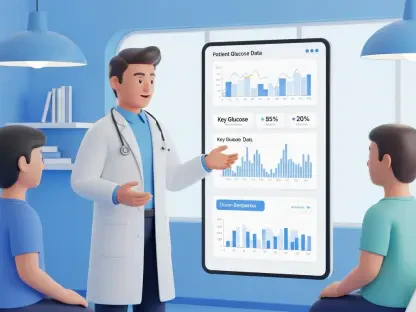Imagine stepping into a hospital only to find not a bustling waiting area but a serene environment where most patients are at home, connecting with their doctors through virtual consultations. This is not science fiction; this is today’s reality as healthcare systems have transformed to meet unprecedented challenges like pandemics and rising chronic diseases. Digital healthcare strategies have rooted themselves into our daily lives, changing how we receive and perceive care.
The Driving Force Behind Change
Globally, chronic diseases are on the rise, demanding swift, efficient healthcare solutions. This pressing need, compounded by the swift spread of COVID-19, has accelerated advancements in patient-centered care methods. Today’s healthcare landscape is a testament to innovation’s potential in addressing critical health issues and improving patient engagement through technology.
Strategies Shaping the Future
A variety of adaptation strategies are crucial in shaping healthcare’s transformation. Flexible patient engagement stands at the forefront, with virtual and telehealth services catering to an array of patient needs and circumstances. The demand for clinically validated digital health technologies is skyrocketing, moving beyond hype. Solutions focused on managing conditions like diabetes are rigorously assessed for clinical effectiveness, ensuring real benefits over mere investment appeal. Furthermore, collaboration among healthcare players is vital in managing chronic diseases effectively. Initiatives such as remote patient monitoring foster alliances and push for shared objectives.
Industry Insights: A Vision for Tomorrow
Healthcare industry leaders emphasize the necessity of advancing patient engagement and adopting technology strategically. Collaboration reveals promising avenues, evidenced by HealthSnap’s efforts to access remote monitoring tools collaboratively, including with competitors. These efforts serve as a blueprint for maximizing the benefits of shared knowledge and resources in overcoming chronic disease hurdles.
Implementation and Strategic Pathways
Healthcare providers champion adaptive engagement models to cater to diverse patient scenarios. Establishing frameworks that ensure rigorous clinical validation of digital solutions becomes paramount to truly benefit patients. Moreover, fostering alliances among stakeholders is crucial, laying a foundation for enduring management of chronic conditions. Strategic cooperation is pivotal in sustaining these advancements and delivering resilient healthcare solutions.
Reflecting on the Journey Ahead
In 2025, health systems will have evolved to embrace digital innovations, ensuring patient engagement and genuine clinical improvements. This transformative journey requires strategic partnerships and a commitment to sustainable healthcare practices. As healthcare continues to progress, maintaining the balance between innovation and proven clinical efficacy remains key. Health systems are tasked with crafting paths that lead to effective management of chronic diseases, fostering a collaborative ecosystem where patient well-being becomes the shared focus.









